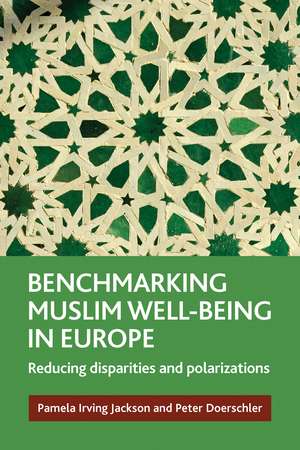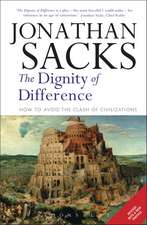Benchmarking Muslim Well-Being in Europe: Reducing Disparities and Polarizations
Autor Pamela Irving Jackson, Peter Doerschleren Limba Engleză Hardback – 10 iul 2012
Examining an urgent topic for many nations around the world, this book aims to reverse the commonly held belief that recent Muslim immigrants to Europe have failed to integrate satisfactorily into European culture. The authors look at Muslim communities in Germany, France, the Netherlands, and the United Kingdom—countries with a range of differing strategies for coordinating ethnic and state identities. Using the European Parliament’s benchmarking guidelines, surveys, and other data, they find several locations where Muslims are in fact more integrated than popularly assumed. Additionally, they show that many Muslim communities, despite a desire for fuller integration, find their opportunities blocked.
Preț: 774.98 lei
Preț vechi: 1006.48 lei
-23% Nou
Puncte Express: 1162
Preț estimativ în valută:
148.31€ • 154.27$ • 122.44£
148.31€ • 154.27$ • 122.44£
Carte tipărită la comandă
Livrare economică 14-28 aprilie
Preluare comenzi: 021 569.72.76
Specificații
ISBN-13: 9781847428875
ISBN-10: 1847428878
Pagini: 208
Ilustrații: 7 figures, 33 tables
Dimensiuni: 152 x 229 x 18 mm
Greutate: 0.48 kg
Ediția:New.
Editura: Bristol University Press
Colecția Policy Press
ISBN-10: 1847428878
Pagini: 208
Ilustrații: 7 figures, 33 tables
Dimensiuni: 152 x 229 x 18 mm
Greutate: 0.48 kg
Ediția:New.
Editura: Bristol University Press
Colecția Policy Press
Notă biografică
Pamela Irving Jackson is director of the Justice Studies Program and professor of sociology at Rhode Island College. Peter Doerschler is assistant professor of political science at Bloomsburg University of Pennsylvania.
Cuprins
List of tables and figures
Acknowledgements
Preface
1. Benchmarking the well-being of European Muslims
2. State involvement in Muslim well-being
3. European Muslims’ confidence in the justice system
4. Muslims in European politics: support for democracy and trust in the political system
5. Muslims’ experiences of discrimination in public institutions
6. The general well-being of Muslims in Europe
7. Reducing disparities and polarizations in Europe
Appendix I: ESS variables
Appendix 2: Descriptives of variables from ALLBUS (2008)
References
Index
Acknowledgements
Preface
1. Benchmarking the well-being of European Muslims
2. State involvement in Muslim well-being
3. European Muslims’ confidence in the justice system
4. Muslims in European politics: support for democracy and trust in the political system
5. Muslims’ experiences of discrimination in public institutions
6. The general well-being of Muslims in Europe
7. Reducing disparities and polarizations in Europe
Appendix I: ESS variables
Appendix 2: Descriptives of variables from ALLBUS (2008)
References
Index
Recenzii
“The key contribution of this book is that the authors are able to quantify the degree of trust expressed by Muslims in specific public institutions, which is then compared to how non-Muslim countrymen rate the same institutions. The findings reveal that Muslims are more socially conservative than their non-Muslim countrymen but, against the prevailing consensus, Muslims appear to be equally, if not more, supportive of the political and juridical process, as well as being equally strong supporters of equality and capitalist goals. These findings undercut much of the anecdotal evidence concerning attitudes of Muslim immigrants, demonstrating that Muslims are invested in democratic governance, the secular state, and the capitalist enterprise. Moreover, these results are all the more surprising given that alongside them, Muslims across all four nations generally report feeling discriminated against and more susceptible to crime than non-Muslim citizens.”
“Benchmarking Muslim well-being in Europe offers hard statistical evidence showing that xenophobes who accuse European Muslims of refusing to integrate are blaming the victims. This authoritative study demonstrates convincingly that Muslims do want to join mainstream society but are often rejected by their non-Muslim fellow citizens. Every political leader and journalist in Europe should read this book.”
“It is a landmark publication in my eyes and very welcome analysis.”














